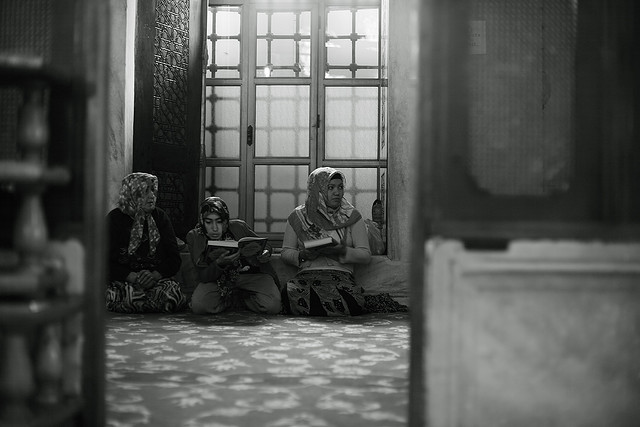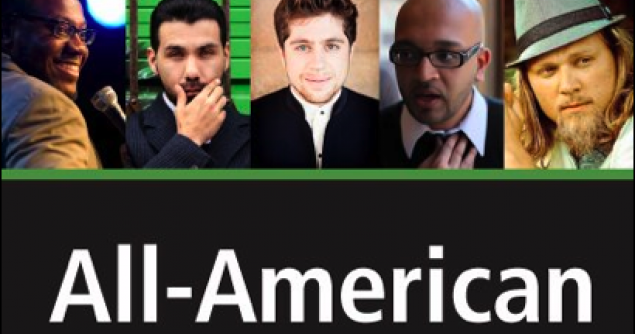The recent Twitter conversation #HijabAndMihrab about women’s complicated relationships with mosques triggered a host of feelings for me. I have a complicated and difficult relationship with my local mosque. While I benefit from praying in a congregation, I can’t deny that as a woman and a convert, I often feel isolated and excluded.
The mosque I attend segregates the men and women by designating one building for its male attendees and the other for its female. The women listen to the imam via loudspeaker, but we are not able to see him or the men sitting in front of him and listening to his lectures. Because of this arrangement, I have no idea who is speaking at any given time and I’ve never once seen the imam’s face.
The only way for me as a woman to access my imam is through a male intermediary, but because I am a convert, I don’t have the luxury of a father, brother or son who can relay my concerns to the imam. I’m also unmarried and expect to remain so for the foreseeable future so I am left with only one option—to ask a woman in my congregation to ask one of the men in her household to ask the imam. Needless to say, this roundabout method is both cumbersome and, when my question is muddled in transmission, ineffective.
As I’ve started attending the weekly Friday prayer more regularly (I was unmosqued until recently), I’ve also come to realize that information about mosque activities like picnics, guest speakers or fundraising dinners, is often shared by word-of-mouth through community networks–networks I am not part of, don’t know how to access, and, until now, didn’t even know existed. The mosque leadership assumes that every Muslim belongs to this social circuitry, so they don’t bother to create an organized way to disseminate information. Their website and social media accounts are only sporadically updated so I can’t turn to their online presence as a reliable way to learn what is going on. There have been community meetings I didn’t know about until after they were over and classes I wouldn’t have realized existed if I had missed the one Friday when they were announced. All this is compounded by the fact that as a woman, I have no choice but to skip one Friday prayer every month.
These hurdles leave me incredibly frustrated because they could all be easily avoided if the mosque community didn’t automatically assume that every Muslim comes from a certain type of background or has a certain life experience. Assumptions are a lazy shortcut to real thinking and analysis and they leave people like myself marginalized. Right now mosques are structured in a way that excludes and, sadly enough, they shove the people most in need of support and education to the periphery of the community, and sometimes right out of it.
Structural marginalization isn’t something that can be fixed by my working harder to make more friends or by pursuing solutions on an individual level. Even if an assertive attitude helps me, it doesn’t help the next person like me. Structural marginalization is something that institutions must solve by critically examining and dismantling the assumptions they make about their congregants.
Changes don’t need to be costly, either. For instance, tearing down the two separate buildings that are my mosque and converting them into one requires funding we don’t have. However, by appointing a women and children’s coordinator who could act as a link between the female congregants and the mosque leadership, and would share information and help women get access to the imam is a relatively small and inexpensive change that would go a long way toward making me feel more welcome and integrated. Simple, thoughtful organizational changes like this one would reassure women and converts that they are an integral part of the community and not an afterthought.
Laura Poyneer is an European-American convert to Islam who lives near Seattle. She works in online tech support and volunteers for the Muslim Anti-Racism Collaborative. She is active on Twitter at http://twitter.com/muhajabah.
Photo Credit: Camil Tulcan






You are so spot on regarding this subject! I go thru the exact same thing which is why I have chosen to not go to the mosque anymore. It’s been yrs. I am also a convert of 7 yrs, white American. Sad situation and totally unfair.
Thank you for writing this very critical issue. We are constructing mega mosques that are just big men’s sections. We get excited when people convert to Islam and then ignore our new Muslims. Also we can’t complain that Islamophobes say Islam is misogynistic when Muslim women are banished to basements and balconies. We can do better than this. Otherwise we will be left with large empty prayer halls.
Meant to say thank you for writing on this critical issue. Aaargh.
I advice you visit the Richardson Masjid in Dallas. We have a women’s committee under the guidance of Imam/Resident Scholar. Also there is a new scholar in town named Umair Ahmad (my son-in-law) in Seattlle who is easily accessible. For more info please contact me at daakya at gmail.